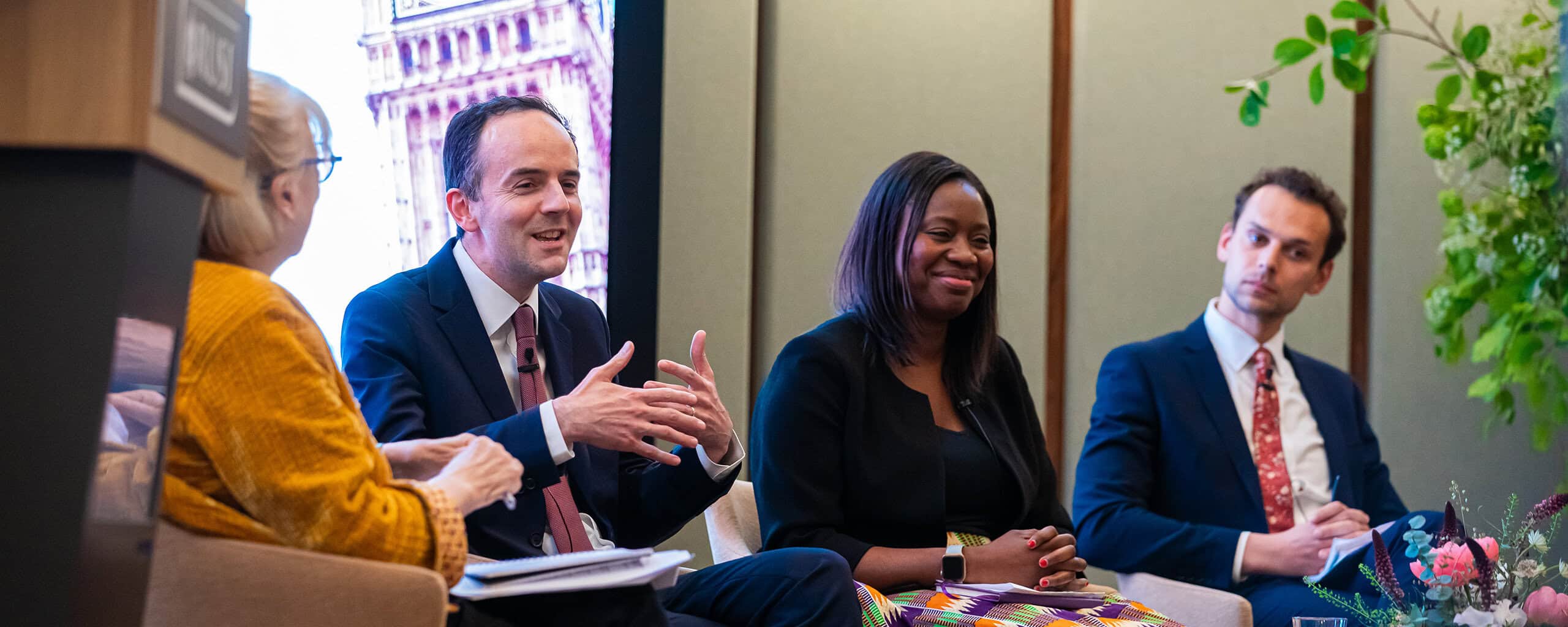
As a bank, we do not have a political position and our clients have a wide range of views on politics but with manifestos being finalised and political battle lines drawn, we thought it would be insightful to hear from key Labour figures on the potential that lies in store.
With almost perfect timing, a week before the Prime Minister announced in the pouring rain that he was calling a general election, we held a Chatham House panel event for clients hosted by Polly Toynbee, the renowned Guardian political and social commentator. Our panellists for the evening were Dr Miatta Fahnbulleh, the Labour Party parliamentary candidate for Peckham, James Murray, MP for Ealing North and Josh Simons, Director of the political think tank, Labour Together. Here are some key highlights from the discussion.
Labour is not seen to be on the side of business. To what extent has that barrier been broken?
The panellists told the audience that when they have met businesses up and down the country the overriding message from them is that they want stability, certainty and predictability – and a government they can work with. Rachel Reeves, the Shadow Chancellor of the Labour Party, has said publicly that Labour wants to be a pro-business party working together to keep the economy growing – and the panel said that through its actions, it will prove it. Labour’s central mission is to grow the economy but the panel admitted they cannot do that if they are not in partnership with business. “This is not a political slogan; it is not a tactic. It is just the reality,” said one panellist.
However, the discussion highlighted that its partnership with business should not be short-term. Governments all over the world including Australia, the US, Canada, and Germany have recently won elections because their right-wing opponents have failed. However, it was highlighted that many have struggled since coming to power because they are not delivering material economic improvements to people’s pockets. “If Labour comes to power, it has to mean what it says about forging a ‘real relationship’ with businesses if it is to win [a second term] again,” said one.
Will accepting the same fiscal rules and treasury conventions be a challenge?
The panel were very clear that it believes it is impossible to build a credible offer in opposition without iron-clad fiscal rules. The rules, they said, will underpin everything that it wants to achieve and advocate the changes to enable private sector-led growth; it will form the foundation for getting the economy to grow. “With stability, we will be able to work in partnership with businesses to remove the barriers to investment to invest in the industries of the future,” added one member of the panel.
How confident are you in Labour’s growth plan?
One member of the panel urged the audience not to underestimate Keir Starmer’s and Labour’s commitment to implementing a new way of governing to get the desired results. But the panel are in a confident mood that they have dug into the details beyond the manifesto headline-grabbing policy to make the plan work. “The level of detail is not like what I have seen before,” said one. “There is huge confidence.”
What are you going to do about the Treasury’s black hole?
The panellists are under no illusions that the next government will inherit an incredibly difficult situation should it get a firsthand look at the Treasury’s books. Tax revenues are extremely high – yet Labour has said that it is not talking about or wanting to put up taxes. A panel member said that the NHS and schools will need a more immediate injection of cash and said that Labour will look to close some tax loopholes such as with non-doms, tax avoidance and modernising HMRC. But it goes back to growth. “The only way to get sustainable finances for public services is to get the economy growing,” added a panellist.
Do you think attitudes have changed to be more socially democratic?
All the panellists, to varying degrees, agreed that the attitudes of voters had changed and this has been evident not only by the recent local election results but also by knocking on people’s doors and speaking to them in person. “There is a sense of hopelessness and genuine anger,” said a member of the panel. But there is a bigger challenge that lies in wait. A theme throughout the discussion is that any meaningful change will take more than one term of office. Yet, governments around the world are struggling to figure out what it means to govern responsibly in today’s age. The challenge for Labour will be how, as a centre-left party, it can reassure an electorate that is more willing to switch allegiance very quickly. “That is going to require doing things differently and experimenting,” said a panellist.
What do you hope to achieve in five years, should you come to power?
The overriding hope is that it has raised living standards and that the current housing crisis shows signs of easing. One member of the panel said that its Green Prosperity Plan could be a game-changer. They said that the transition to net zero has to happen and is a real opportunity, creating jobs and growing industries. “If we get momentum and give people hope that we are turning things around, then we have a chance for a second term,” they added.
